| Overlord Mountain | |
|---|---|
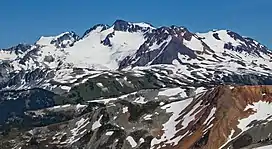 Overlord Massif, seen from Whistler Mountain | |
| Highest point | |
| Elevation | 2,625 m (8,612 ft)[1] |
| Prominence | 415 m (1,362 ft)[1] |
| Parent peak | Mount Macbeth (2639 m)[1] |
| Listing | Mountains of British Columbia |
| Coordinates | 50°0′56″N 122°49′15″W / 50.01556°N 122.82083°W[2] |
| Geography | |
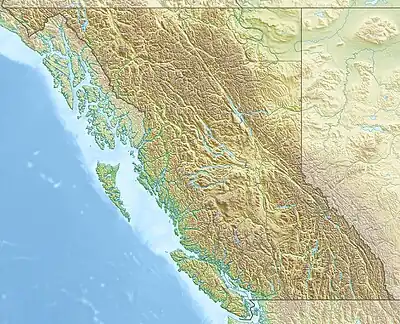 Overlord Mountain Location in British Columbia 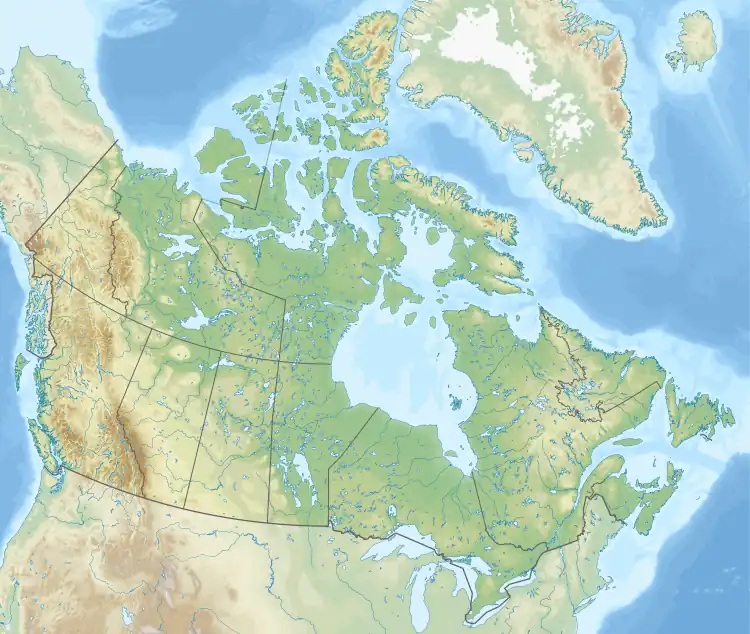 Overlord Mountain Overlord Mountain (Canada) | |
| Country | Canada |
| Province | British Columbia |
| District | New Westminster Land District |
| Protected area | Garibaldi Provincial Park |
| Parent range | Fitzsimmons Range Garibaldi Ranges Coast Ranges |
| Topo map | NTS 92J2 Whistler[2] |
| Climbing | |
| First ascent | 1923 by Phyllis Munday, Don Munday[1] |
| Easiest route | class 2 via Benvolio Glacier |
Overlord Mountain is a 2,625-metre (8,612-foot) glacier-clad peak located in the Garibaldi Ranges of the Coast Mountains, in Garibaldi Provincial Park of southwestern British Columbia, Canada. It is the highest point of the Fitzsimmons Range, which is a subset of the Garibaldi Ranges, and can be readily seen from the Whistler Blackcomb ski area.[3] It is situated 15 km (9 mi) southeast of Whistler, and its nearest higher peak is Mount Macbeth, 3 km (2 mi) to the north-northeast.[3] The Benvolio Glacier rests below the south aspect of the summit, the Fitzsimmons Glacier on the east aspect, and the expansive Overlord Glacier spans the northern and western aspects of the mountain. Precipitation runoff from the peak and meltwater from its glaciers drains into tributaries of the Cheakamus River. The first ascent of the mountain was made in 1923 by Phyllis Munday and Don Munday via the Benvolio Glacier.[1] The mountain's descriptive name was recommended by the Garibaldi Park Board and officially adopted on September 2, 1930, by the Geographical Names Board of Canada.[2][4]
Climate
Based on the Köppen climate classification, Overlord Mountain is located in the marine west coast climate zone of western North America.[5] Most weather fronts originate in the Pacific Ocean, and travel east toward the Coast Mountains where they are forced upward by the range (Orographic lift), causing them to drop their moisture in the form of rain or snowfall. As a result, the Coast Mountains experience high precipitation, especially during the winter months in the form of snowfall. Temperatures can drop below −20 °C with wind chill factors below −30 °C. The months July through September offer the most favorable weather for climbing Overlord Mountain.
Climbing Routes
Established climbing routes on Overlord Mountain:[1]
Gallery
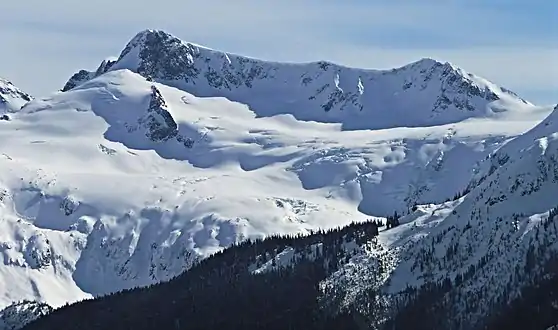 Overlord Mountain in winter
Overlord Mountain in winter Overlord Mountain from Whistler Mountain
Overlord Mountain from Whistler Mountain Overlord Mountain and Overlord Glacier
Overlord Mountain and Overlord Glacier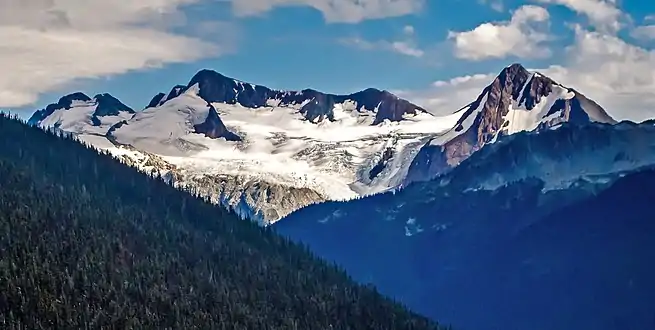 Left to right: Mt. Fitzsimmons, Overlord Mountain, Fissile Peak
Left to right: Mt. Fitzsimmons, Overlord Mountain, Fissile Peak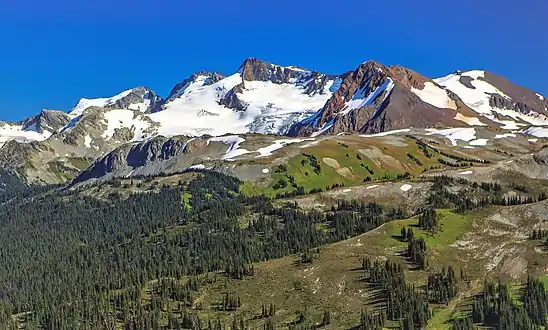
 Overlord Mountain (right) from slopes of Whistler. Spearhead Range to left
Overlord Mountain (right) from slopes of Whistler. Spearhead Range to left
See also
References
- 1 2 3 4 5 6 "Overlord Mountain". Bivouac.com. Retrieved 2019-11-15.
- 1 2 3 "Overlord Mountain". Geographical Names Data Base. Natural Resources Canada. Retrieved 2019-11-15.
- 1 2 "Overlord Mountain, British Columbia". Peakbagger.com. Retrieved 2019-11-12.
- ↑ "Overlord Mountain". BC Geographical Names. Retrieved 2019-11-12.
- ↑ Peel, M. C.; Finlayson, B. L.; McMahon, T. A. (2007). "Updated world map of the Köppen−Geiger climate classification". Hydrol. Earth Syst. Sci. 11. ISSN 1027-5606.
External links
- Weather: Overlord Mountain